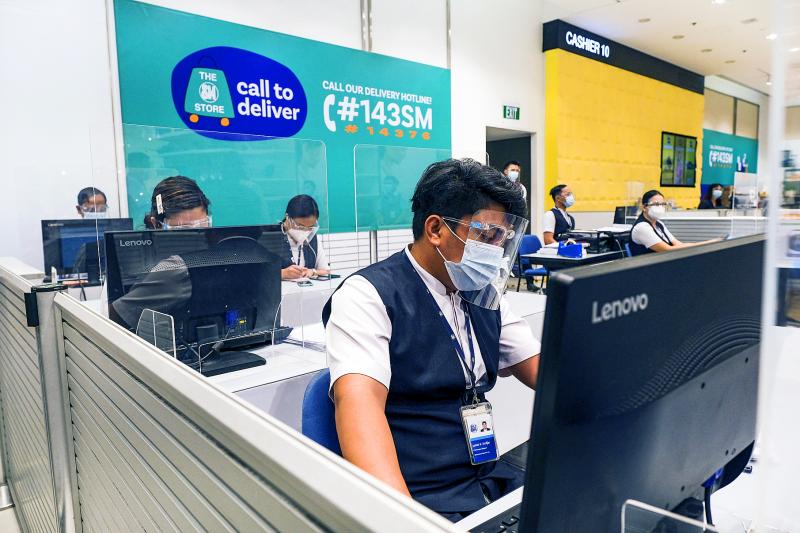The Philippines should adopt policies for call centers that fit the post-pandemic workplace, the head of an industry group said, as it seeks to extend the sector’s two decades of growth.
The Contact Center Association of the Philippines sees a shift toward working from home as an adaptation that could become entrenched after the COVID-19 era.
However, some tax breaks crucial to the industry are only valid if the bulk of their employees work in designated economic zones.

Photo: Bloomberg
“No business is thinking we will just go back after this pandemic is over to the way we were,” association chairman Benedict Hernandez said.
He urged the government to develop a long-term policy that recognizes the new reality of hybrid home-office work.
The association expects the outsourcing industry’s revenues to grow 9 percent this year, outpacing the 6 to 7 percent expected for the sector globally, as more companies shift toward digitalization.
“It’s an encouraging yet vulnerable recovery,” Hernandez said. The outsourcing industry, which includes call centers, needs “support and protection so that we can continue creating more jobs and helping the economy recover.”
With most Filipinos proficient in English, call centers have played an increasingly important role in the country’s economy since the 1990s, creating millions of jobs and driving consumption. As exporters of information technology services are often located inside designated economic zones, many of the companies enjoy special tax breaks.
Call centers employ about 800,000 people in the Southeast Asian nation, about three-quarters of the 1.3 million workers in the outsourcing sector, and add as many as 80,000 new jobs per year.
As the global recovery continues, more companies could look to cut costs by moving jobs offshore, creating more opportunities for Philippine outsourcing companies, Hernandez said.
Still, the industry faces a number of risks.
Fresh COVID-19 outbreaks are prompting clients who might have concentrated operations in a single country to reconsider that strategy.
To bolster its competitiveness, the Philippines needs to catch up in vaccinating employees, upgrading infrastructure and implementing supportive government policies, Hernandez said.
Among the challenges are infrastructure investments by telecommunication companies to bolster at-home connectivity.
“We’re very happy with how much speed and capital they’re laying out,” Hernandez said. “It’s getting better, but we’re not yet there.”
A 1994 law on economic zones must also be updated for the outsourcing industry, Hernandez said. The law gives tax breaks to companies whose output is produced in the zones, which suggests employees must be working onsite.
Amid the pandemic, about 60 percent of total call center employees are working from home, with some companies now fully home-based. The government recently allowed companies in the economic zones to let as many as 90 percent of employees work from home through next March.
That extension “buys us time,” Hernandez said, but is not a durable solution.
The administration of Philippine President Rodrigo Duterte has been generally cautious about using fiscal measures to counter the effects of the pandemic, although an order imposing 12 percent value-added tax on exporters’ transactions, which could affect call centers, has been deferred for now.
Some outsourcing firms worry that a reduction in government tax incentives earlier this year could make the Philippines more costly for business and drive away investors.
“It’s been a resilient industry,” Hernandez said. “This year, we’re seeing a very promising recovery, but that continues to be vulnerable. We still need support.”

The Eurovision Song Contest has seen a surge in punter interest at the bookmakers, becoming a major betting event, experts said ahead of last night’s giant glamfest in Basel. “Eurovision has quietly become one of the biggest betting events of the year,” said Tomi Huttunen, senior manager of the Online Computer Finland (OCS) betting and casino platform. Betting sites have long been used to gauge which way voters might be leaning ahead of the world’s biggest televised live music event. However, bookmakers highlight a huge increase in engagement in recent years — and this year in particular. “We’ve already passed 2023’s total activity and

Nvidia Corp CEO Jensen Huang (黃仁勳) today announced that his company has selected "Beitou Shilin" in Taipei for its new Taiwan office, called Nvidia Constellation, putting an end to months of speculation. Industry sources have said that the tech giant has been eyeing the Beitou Shilin Science Park as the site of its new overseas headquarters, and speculated that the new headquarters would be built on two plots of land designated as "T17" and "T18," which span 3.89 hectares in the park. "I think it's time for us to reveal one of the largest products we've ever built," Huang said near the

China yesterday announced anti-dumping duties as high as 74.9 percent on imports of polyoxymethylene (POM) copolymers, a type of engineering plastic, from Taiwan, the US, the EU and Japan. The Chinese Ministry of Commerce’s findings conclude a probe launched in May last year, shortly after the US sharply increased tariffs on Chinese electric vehicles, computer chips and other imports. POM copolymers can partially replace metals such as copper and zinc, and have various applications, including in auto parts, electronics and medical equipment, the Chinese ministry has said. In January, it said initial investigations had determined that dumping was taking place, and implemented preliminary

Intel Corp yesterday reinforced its determination to strengthen its partnerships with Taiwan’s ecosystem partners including original-electronic-manufacturing (OEM) companies such as Hon Hai Precision Industry Co (鴻海精密) and chipmaker United Microelectronics Corp (UMC, 聯電). “Tonight marks a new beginning. We renew our new partnership with Taiwan ecosystem,” Intel new chief executive officer Tan Lip-bu (陳立武) said at a dinner with representatives from the company’s local partners, celebrating the 40th anniversary of the US chip giant’s presence in Taiwan. Tan took the reins at Intel six weeks ago aiming to reform the chipmaker and revive its past glory. This is the first time Tan